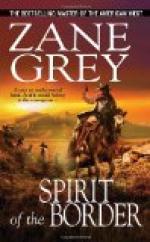Joe felt, rather than heard, the approach of some one, and he turned to see Wetzel coming down the path.
“He’s a lone Shawnee runner,” said the hunter, gazing down at the dead Indian. “He was tryin’ to win his eagle plumes. I seen you both from the hillside.”
“You did!” exclaimed Joe. Then he laughed. “It was lucky for me. I tried the dodge you taught me, but in my eagerness I missed.”
“Wal, you hadn’t no call fer hurry. You worked the trick clever, but you missed him when there was plenty of time. I had to shoot over your shoulder, or I’d hev plugged him sooner.”
“Where were you?” asked Joe.
“Up there by that bit of sumach!” and Wetzel pointed to an open ridge on a hillside not less than one hundred and fifty yards distant.
Joe wondered which of the two bullets, the death-seeking one fired by the savage, or the life-saving missile from Wetzel’s fatal weapon, had passed nearest to him.
“Come,” said the hunter, after he had scalped the Indian.
“What’s to be done with this savage?” inquired Joe, as Wetzel started up the path.
“Let him lay.”
They returned to camp without further incident. While the hunter busied himself reinforcing their temporary shelter—for the clouds looked threatening—Joe cut up some buffalo meat, and then went down to the brook for a gourd of water. He came hurriedly back to where Wetzel was working, and spoke in a voice which he vainly endeavors to hold steady:
“Come quickly. I have seen something which may mean a good deal.”
He led the way down to the brookside.
“Look!” Joe said, pointing at the water.
Here the steam was about two feet deep, perhaps twenty wide, and had just a noticeable current. Shortly before, it had been as clear as a bright summer sky; it was now tinged with yellow clouds that slowly floated downstream, each one enlarging and becoming fainter as the clear water permeated and stained. Grains of sand glided along with the current, little pieces of bark floated on the surface, and minnows darted to and fro nibbling at these drifting particles.
“Deer wouldn’t roil the water like that. What does it mean?” asked Joe.
“Injuns, an’ not fer away.”
Wetzel returned to the shelter and tore it down. Then he bent the branch of a beech tree low over the place. He pulled down another branch over the remains of the camp-fire. These precautions made the spot less striking. Wetzel knew that an Indian scout never glances casually; his roving eyes survey the forest, perhaps quickly, but thoroughly. An unnatural position of bush or log always leads to an examination.
This done, the hunter grasped Joe’s hand and led him up the knoll. Making his way behind a well-screened tree, which had been uprooted, he selected a position where, hidden themselves, they could see the creek.
Hardly had Wetzel, admonished Joe to lie perfectly still, when from a short distance up the stream came the sound of splashing water; but nothing could be seen above the open glade, as in that direction willows lined the creek in dense thickets. The noise grew more audible.




